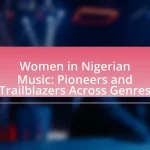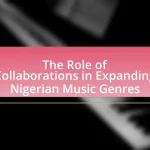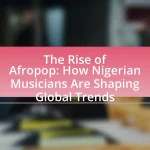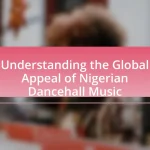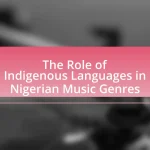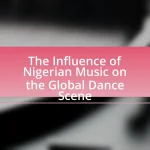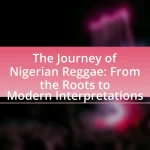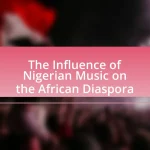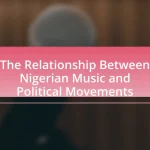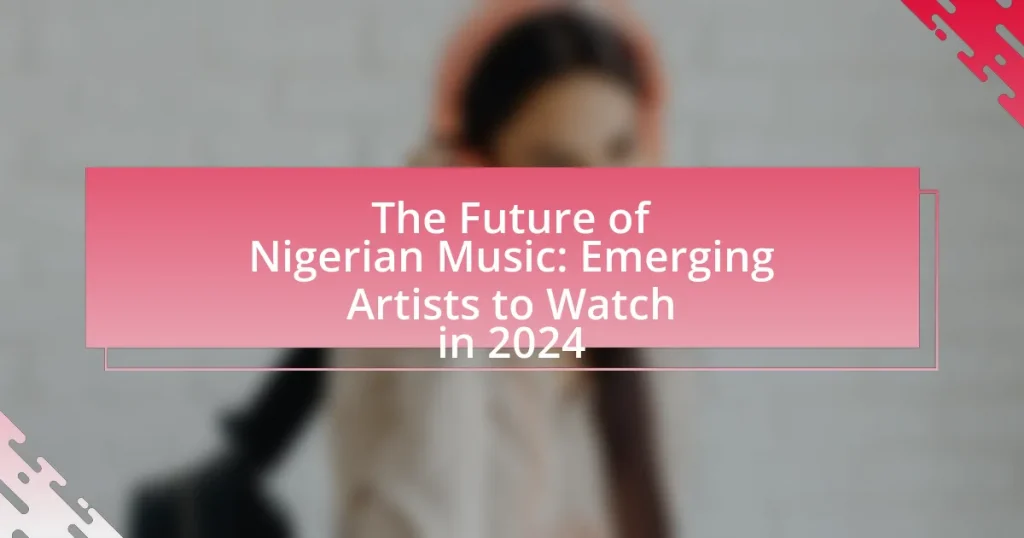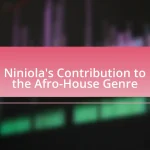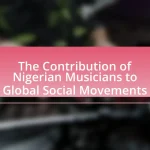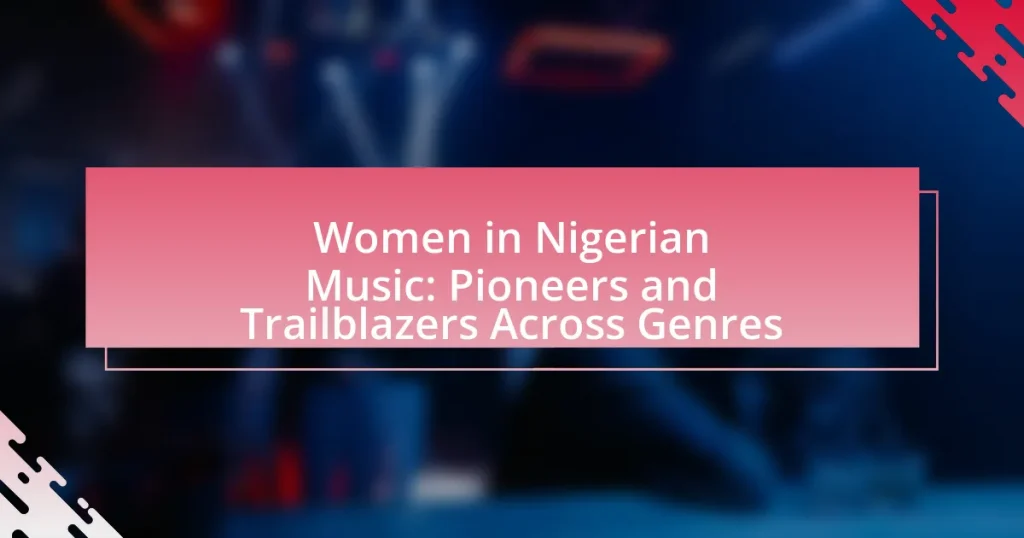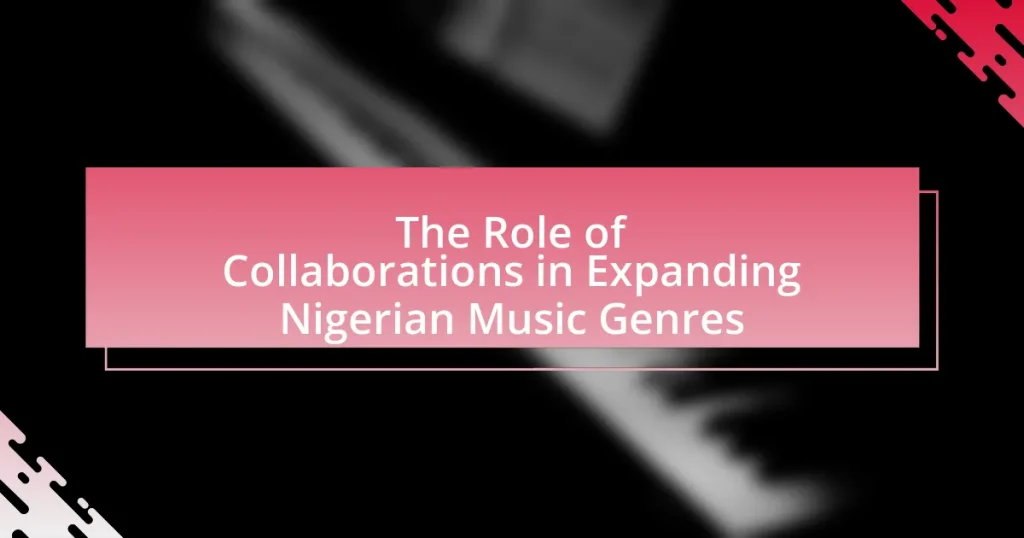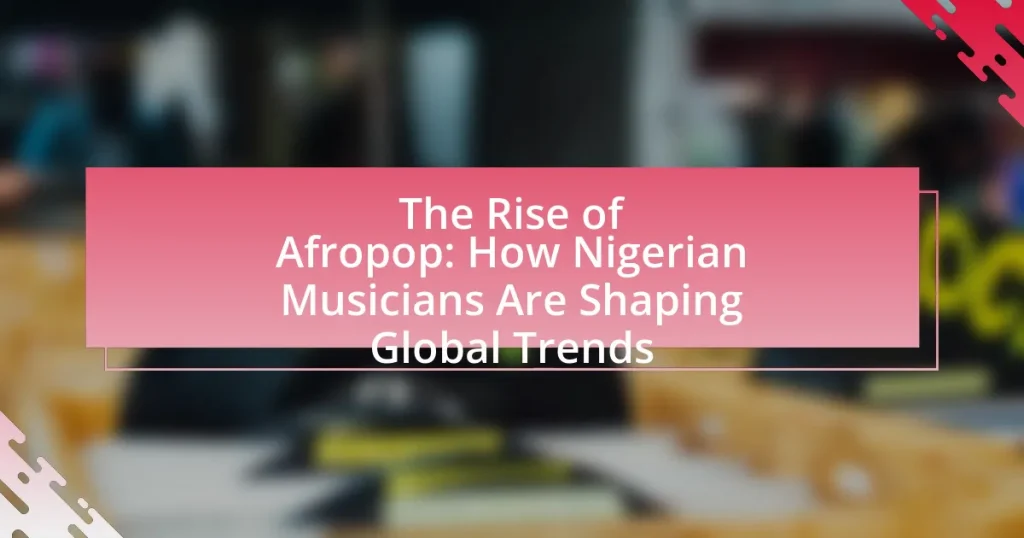The article focuses on the current state and future of Nigerian music, highlighting the rise of emerging artists in 2024. It examines the evolution of Nigerian music over the past decade, emphasizing the popularity of Afrobeats and the influence of key artists like Burna Boy, Wizkid, and Tems. The piece also discusses the challenges faced by emerging artists, the impact of digital platforms on visibility, and the significance of collaborations in expanding their reach. Additionally, it identifies notable emerging talents such as Ayra Starr, Omah Lay, and BNXN, while outlining strategies for success in the evolving music landscape.
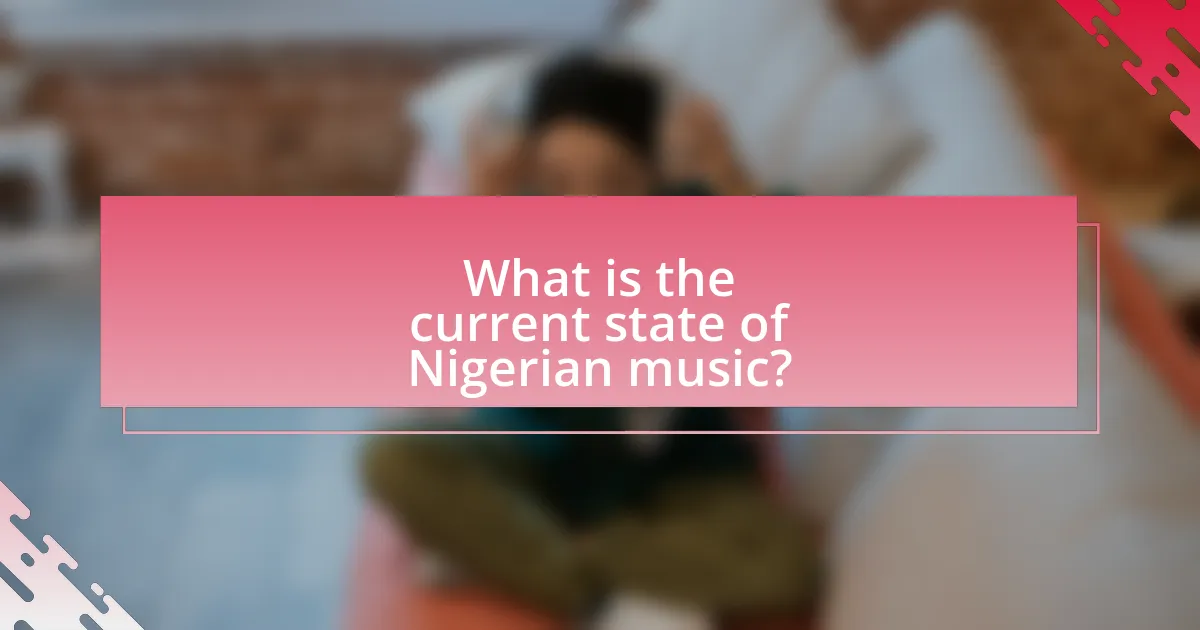
What is the current state of Nigerian music?
The current state of Nigerian music is vibrant and influential, characterized by a blend of traditional sounds and contemporary genres such as Afrobeats, hip-hop, and R&B. Nigerian artists like Burna Boy, Wizkid, and Tems have gained international recognition, with Afrobeats becoming a global phenomenon, evidenced by Burna Boy’s Grammy win in 2021 and Wizkid’s collaborations with global artists. The Nigerian music industry is also supported by a growing digital landscape, with platforms like Spotify and Apple Music expanding access to Nigerian music worldwide, further solidifying its impact on the global stage.
How has Nigerian music evolved over the past decade?
Nigerian music has evolved significantly over the past decade, transitioning from traditional genres to a more diverse and globally recognized sound. The rise of Afrobeats, characterized by its fusion of various musical styles including hip-hop, dancehall, and highlife, has played a crucial role in this evolution. Artists like Burna Boy, Wizkid, and Davido have gained international acclaim, with Burna Boy winning a Grammy Award in 2020 for his album “Twice as Tall,” which showcases the global reach and influence of Nigerian music. Additionally, the proliferation of digital platforms has allowed emerging artists to gain visibility and connect with audiences worldwide, further diversifying the musical landscape in Nigeria.
What genres are currently popular in Nigeria?
Afrobeats is currently the most popular genre in Nigeria, characterized by its fusion of African rhythms with global music influences. This genre has gained international recognition, with artists like Burna Boy and Wizkid leading the charge. According to the International Federation of the Phonographic Industry (IFPI), Afrobeats has seen a significant rise in streaming numbers, indicating its growing global appeal. Other popular genres in Nigeria include hip-hop, highlife, and gospel music, reflecting the diverse musical landscape of the country.
Who are the key influencers shaping Nigerian music today?
Key influencers shaping Nigerian music today include Burna Boy, Wizkid, and Tems. Burna Boy has gained international acclaim with his Grammy-winning album “Twice as Tall,” which showcases Afro-fusion and has significantly impacted global music trends. Wizkid, known for his hit “Essence,” has played a crucial role in popularizing Afrobeats worldwide, collaborating with artists across various genres. Tems, recognized for her unique sound and contributions to tracks like “Essence,” has emerged as a powerful voice in the industry, further elevating Nigerian music on the global stage. These artists are not only shaping the sound of contemporary Nigerian music but also influencing its reception and growth internationally.
What role do emerging artists play in the Nigerian music scene?
Emerging artists play a crucial role in the Nigerian music scene by introducing innovative sounds and diverse genres that reflect contemporary cultural dynamics. These artists often blend traditional Nigerian music with global influences, creating unique fusions that resonate with both local and international audiences. For instance, artists like Omah Lay and Tems have gained significant recognition for their fresh approaches, contributing to the global popularity of Afrobeats. Their success demonstrates how emerging talent can drive the evolution of the music industry in Nigeria, attracting investment and expanding the market.
How do emerging artists differ from established ones?
Emerging artists differ from established ones primarily in their level of recognition and experience within the music industry. Emerging artists typically have limited exposure and a smaller fan base, often relying on social media and digital platforms to gain traction, while established artists benefit from a solid reputation, extensive networks, and a loyal following built over years of work. For instance, according to a 2022 report by the International Federation of the Phonographic Industry, emerging artists often face challenges in securing major label deals and radio play, which established artists usually have access to due to their proven track record. This disparity in resources and visibility significantly impacts their ability to reach wider audiences and achieve commercial success.
What challenges do emerging artists face in Nigeria?
Emerging artists in Nigeria face significant challenges, including limited access to funding, inadequate infrastructure, and a lack of industry support. Funding is often scarce, as many artists struggle to secure financial backing for their projects, which hinders their ability to produce quality music and promote their work. Additionally, the infrastructure for music distribution and promotion is underdeveloped, making it difficult for artists to reach wider audiences. Furthermore, the Nigerian music industry lacks robust support systems, such as mentorship programs and networking opportunities, which are crucial for the growth and development of new talent. These challenges collectively impede the progress of emerging artists in Nigeria.
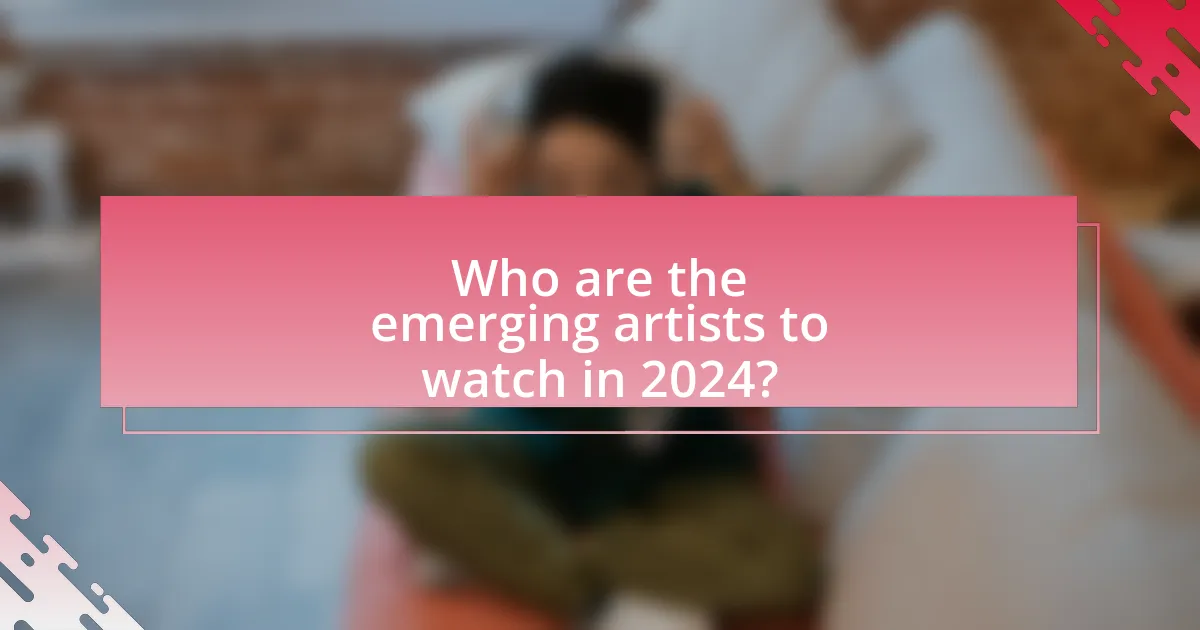
Who are the emerging artists to watch in 2024?
The emerging artists to watch in 2024 include Ayra Starr, Omah Lay, and BNXN. Ayra Starr gained significant attention with her hit “Away” and has been recognized for her unique sound and style, which blends Afropop and R&B. Omah Lay, known for his chart-topping singles like “Bad Influence,” has been praised for his innovative approach to music, combining Afrobeat with contemporary sounds. BNXN, formerly known as Buju, has made waves with collaborations and his distinct vocal delivery, positioning him as a key figure in the Nigerian music scene. These artists are expected to shape the future of Nigerian music with their fresh perspectives and growing fanbases.
What criteria define an emerging artist in the Nigerian music industry?
An emerging artist in the Nigerian music industry is primarily defined by their recent entry into the music scene, typically characterized by the release of their first professional recordings or significant performances. These artists often have a growing fan base, evidenced by increasing social media followers and streaming numbers, which indicate their rising popularity. Additionally, they may receive recognition through nominations or wins in local music awards, showcasing their potential and impact within the industry. The Nigerian music landscape is dynamic, and emerging artists often reflect contemporary trends, incorporating diverse musical influences that resonate with younger audiences.
How do social media and streaming platforms impact their visibility?
Social media and streaming platforms significantly enhance the visibility of emerging artists by providing direct access to a global audience. These platforms allow artists to share their music, engage with fans, and promote their work without the need for traditional media gatekeepers. For instance, according to a 2021 report by the International Federation of the Phonographic Industry, 70% of music listeners discover new artists through social media and streaming services. This direct engagement fosters a community around the artist, amplifying their reach and increasing their chances of success in a competitive market.
What are the common traits of successful emerging artists?
Successful emerging artists typically exhibit traits such as creativity, resilience, and strong networking skills. Creativity allows them to produce unique and innovative work that stands out in a competitive market. Resilience helps them navigate challenges and setbacks, which are common in the early stages of an artistic career. Strong networking skills enable them to build relationships within the industry, leading to collaborations and opportunities for exposure. These traits are essential for gaining recognition and achieving success in the evolving landscape of the music industry, particularly in Nigeria’s vibrant scene.
Which specific artists are gaining traction in 2024?
In 2024, artists such as Ayra Starr, Omah Lay, and BNXN are gaining significant traction in the Nigerian music scene. Ayra Starr’s recent album has topped charts and garnered millions of streams, showcasing her growing popularity. Omah Lay continues to build on his success with collaborations and viral hits, while BNXN’s unique sound and lyrical depth have attracted a dedicated fanbase. These artists are not only making waves locally but are also gaining international recognition, further solidifying their positions in the music industry.
What unique styles or sounds do these artists bring to the table?
Emerging Nigerian artists bring diverse styles and sounds that reflect a fusion of traditional and contemporary influences. For instance, artists like Tems incorporate elements of Afrobeats, R&B, and soul, creating a unique sound characterized by emotive vocals and rich instrumentation. Similarly, Omah Lay blends Afrobeats with alternative and trap influences, resulting in a fresh sound that resonates with younger audiences. Additionally, artists such as Ayra Starr showcase a mix of pop and Afro-fusion, appealing to a global market while maintaining cultural authenticity. These unique styles not only highlight the versatility of Nigerian music but also position these artists as key players in the global music scene.
How are these artists connecting with their audience?
These artists are connecting with their audience through social media engagement, live performances, and relatable content. By utilizing platforms like Instagram, TikTok, and Twitter, they share behind-the-scenes glimpses, personal stories, and interactive content that resonates with fans. For instance, artists often host live Q&A sessions or virtual concerts, fostering a sense of community and direct interaction. This approach not only enhances fan loyalty but also allows artists to receive immediate feedback, shaping their music and brand in real-time.
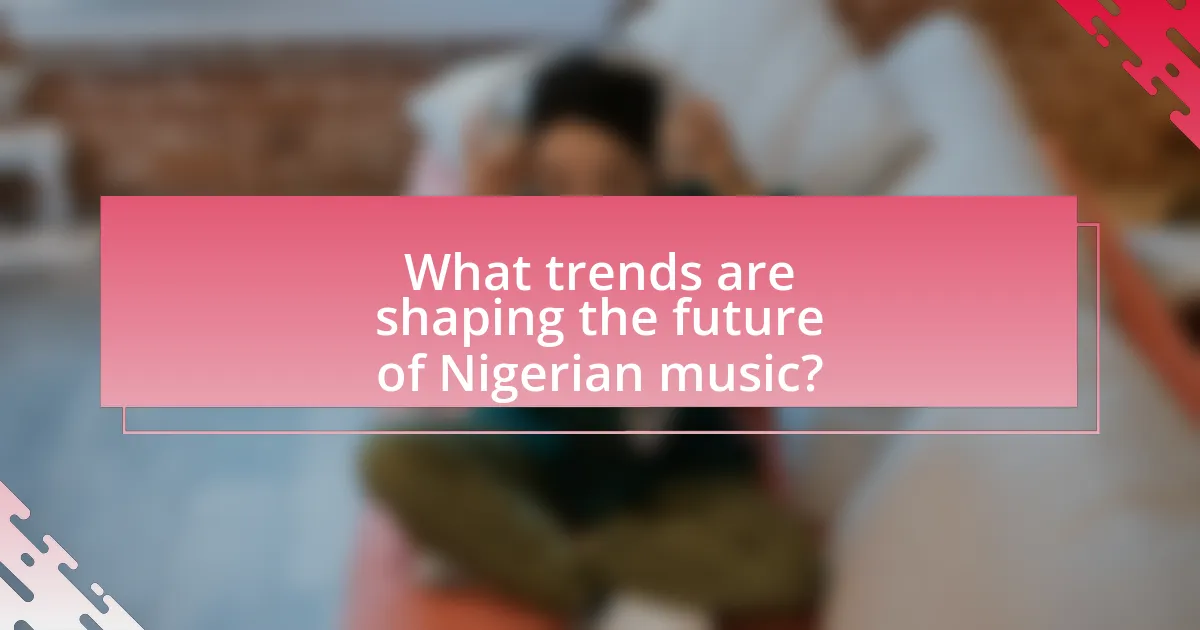
What trends are shaping the future of Nigerian music?
The future of Nigerian music is being shaped by the rise of Afrobeats, increased digital distribution, and the global collaboration of artists. Afrobeats has gained international recognition, with artists like Burna Boy and Wizkid achieving global chart success, which has led to a surge in interest and investment in the genre. Digital platforms such as Spotify and Apple Music have expanded access to Nigerian music, allowing emerging artists to reach wider audiences without traditional barriers. Additionally, collaborations between Nigerian artists and international musicians are becoming more common, further blending genres and expanding the reach of Nigerian music globally. These trends indicate a dynamic evolution in the music scene, positioning Nigerian artists for greater influence in the global music industry.
How is technology influencing music production and distribution?
Technology is significantly influencing music production and distribution by enabling artists to create high-quality music with accessible tools and platforms. Digital audio workstations (DAWs) like Ableton Live and Logic Pro allow musicians to produce tracks from home studios, reducing the need for expensive recording sessions. Additionally, streaming services such as Spotify and Apple Music have transformed how music is distributed, allowing artists to reach global audiences instantly. According to the International Federation of the Phonographic Industry (IFPI), streaming accounted for 62.1% of global recorded music revenue in 2020, highlighting the shift in consumption patterns. This technological evolution empowers emerging artists in Nigeria and worldwide to produce and distribute their music independently, fostering a diverse and dynamic music landscape.
What role do collaborations play in the success of emerging artists?
Collaborations significantly enhance the success of emerging artists by expanding their reach and credibility within the music industry. When artists collaborate with established musicians or other emerging talents, they gain access to new audiences and fan bases, which can lead to increased visibility and opportunities. For instance, a study by the International Federation of the Phonographic Industry (IFPI) highlights that collaborations can boost streaming numbers by up to 50% for the participating artists, demonstrating the tangible impact on their popularity. Additionally, partnerships often lead to creative synergies that can result in innovative music, further attracting listeners and industry attention.
How are cultural influences reflected in the music of 2024?
Cultural influences in the music of 2024 are prominently reflected through the integration of traditional Nigerian sounds with contemporary genres like Afrobeats, hip-hop, and pop. Emerging artists are increasingly incorporating indigenous instruments, local dialects, and storytelling techniques into their music, creating a fusion that resonates with both local and global audiences. For instance, the use of the talking drum and traditional rhythms in modern tracks showcases a commitment to cultural heritage while appealing to modern sensibilities. This blending not only preserves Nigerian musical traditions but also enhances the global appeal of the music, as seen in the rising popularity of artists who successfully merge these elements, thereby attracting diverse listeners and fostering cultural exchange.
What can we expect from the Nigerian music industry in the coming years?
The Nigerian music industry is expected to experience significant growth and global recognition in the coming years. This growth is driven by the increasing popularity of Afrobeats, which has gained traction internationally, evidenced by collaborations between Nigerian artists and global stars like Drake and Beyoncé. Additionally, the rise of digital platforms has enabled emerging artists to reach wider audiences, with streaming services reporting a surge in Nigerian music consumption. The industry is also likely to see a diversification of genres and sounds, as new artists bring innovative styles, further enriching the musical landscape.
How might global music trends affect Nigerian artists?
Global music trends significantly influence Nigerian artists by shaping their sound, style, and marketability. As genres like Afrobeats gain international popularity, Nigerian artists are increasingly blending local sounds with global influences, leading to collaborations with international musicians and producers. For instance, the success of Burna Boy and Wizkid on global charts demonstrates how embracing global trends can enhance visibility and commercial success. Additionally, streaming platforms like Spotify and Apple Music provide Nigerian artists with access to a wider audience, allowing them to capitalize on global music trends and expand their fan base beyond local markets.
What opportunities exist for international collaborations?
International collaborations in Nigerian music present opportunities for cross-cultural exchange, access to global markets, and enhanced artistic innovation. Emerging Nigerian artists can partner with international musicians, producers, and labels to reach wider audiences and gain exposure. For instance, collaborations with established artists from the U.S. or Europe can lead to increased streaming and sales, as seen with Nigerian artists like Burna Boy and Wizkid, who have successfully collaborated with global stars, resulting in chart-topping hits and Grammy nominations. These partnerships not only elevate the artists’ profiles but also contribute to the global appreciation of Afrobeats and Nigerian music.
What strategies can emerging artists adopt for success in 2024?
Emerging artists can adopt a multi-faceted strategy for success in 2024 by leveraging digital platforms, engaging with their audience, and collaborating with established artists. Utilizing social media and streaming services allows artists to reach a global audience, as platforms like Spotify and Apple Music have reported significant growth in user engagement, particularly in the African music scene. Engaging directly with fans through live streams and interactive content fosters a loyal community, which is crucial for building a sustainable career. Collaborating with established artists not only enhances credibility but also exposes emerging talents to new audiences, as seen in successful partnerships within the Nigerian music industry. These strategies are essential for navigating the competitive landscape of the music industry in 2024.
How can artists effectively leverage social media for growth?
Artists can effectively leverage social media for growth by consistently engaging with their audience, showcasing their work, and utilizing targeted advertising. Engaging with followers through comments, live sessions, and polls fosters a sense of community and loyalty, which can lead to increased support and sharing of their content. Showcasing work through high-quality visuals and behind-the-scenes content can attract new fans and keep existing ones interested. Additionally, targeted advertising on platforms like Instagram and Facebook allows artists to reach specific demographics, increasing their visibility and potential fan base. According to a 2021 report by Hootsuite, 54% of social media users use these platforms to research products, indicating that a strong social media presence can directly influence audience growth and engagement.
What are the best practices for networking within the industry?
The best practices for networking within the music industry include attending industry events, leveraging social media, and building genuine relationships. Attending events such as music festivals, conferences, and workshops allows artists to meet industry professionals and peers, fostering connections that can lead to collaborations and opportunities. Leveraging social media platforms like Instagram and Twitter enables artists to showcase their work, engage with fans, and connect with other musicians and industry influencers. Building genuine relationships is crucial; artists should focus on meaningful interactions rather than transactional exchanges, as trust and rapport can lead to long-term partnerships. These practices are supported by the fact that networking is often cited as a key factor in career advancement within the music industry, as highlighted in studies by organizations like the Music Industry Research Association.
